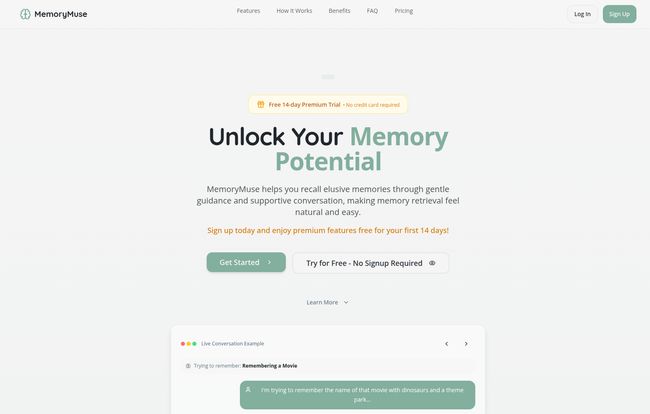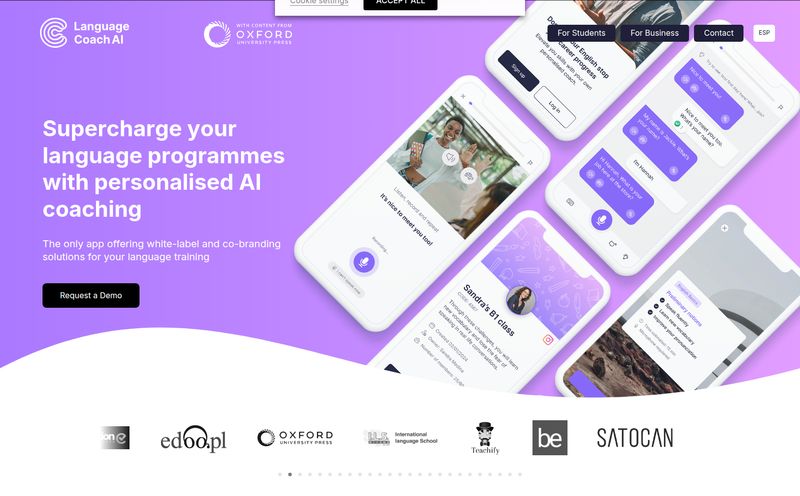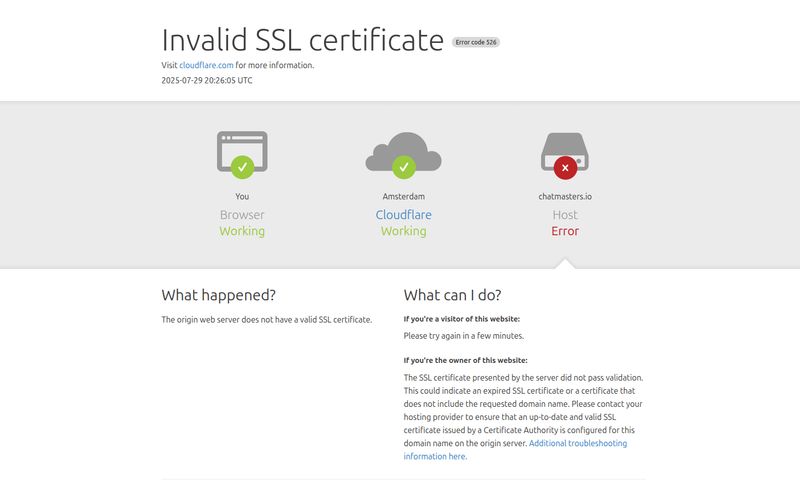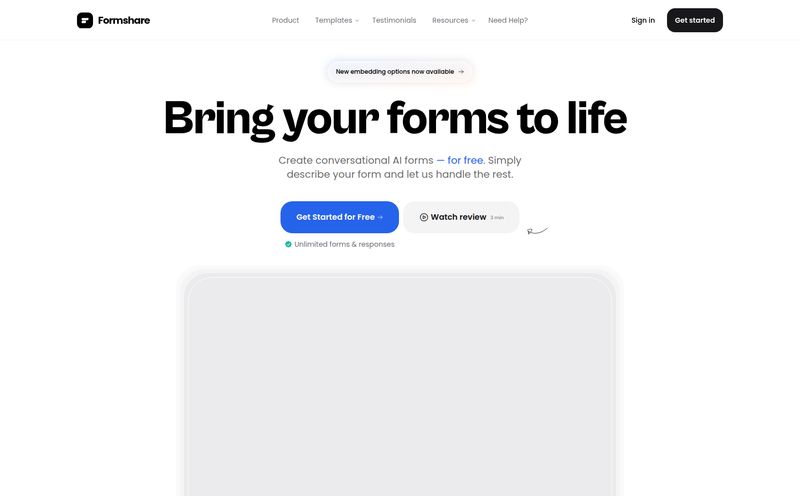You know the feeling. You’re telling a story, and you get to the best part—the name of that actor, you know, the one from that movie about the space cats… he was also in that TV show with the talking dog. Ugh. It’s right there. You can feel the shape of the word in your mouth, but it just won’t come out. Your brain is buffering, and it’s infuriating.
We’ve all been there. It’s a universal moment of human frustration. For years, the only solution was to either give up and let it haunt you for the rest of the day, or just sheepishly pull out your phone and Google it. The instant gratification is nice, but let's be real—it feels like cheating your own brain. You didn't remember it; you just outsourced the job.
Well, what if there was a middle ground? A tool that didn’t just give you the answer, but helped you find it in your own mind? I recently stumbled upon a platform called MemoryMuse, and I have to say, it’s a fascinating take on AI-powered assistance. It’s less of a search engine and more of a… memory coach.

Visit MemoryMuse
So, What Exactly is MemoryMuse?
Okay, let's get this out of the way first: MemoryMuse is not another ChatGPT or Google search. Its entire purpose is to help you retrieve information that’s already stored in your brain somewhere. It’s like having a patient friend who’s really good at playing 20 Questions with you, gently nudging you toward the answer with clever hints and prompts.
I like to think of it as a personal trainer for your brain's recall muscles. Instead of just lifting the weight for you (which is what Google does), it spots you while you do the heavy lifting yourself. This small shift is what makes it so different. The goal isn’t just to find the forgotten name or fact; it's to strengthen the neural pathways you use to find it. So, in theory, you get a little better at remembering things over time. A pretty cool concept, right?
My Walkthrough: How It Actually Works
The process is refreshingly simple. It’s a four-step conversational dance.
I decided to test it with something that always trips me up: the name of a specific book I read a few years ago. I remembered the plot, the main character’s weird obsession with collecting bottle caps, but the title? Gone. Poof.
So, first, I shared my clues. I told MemoryMuse, "I'm trying to remember a sci-fi book about a girl who lives on a junkyard planet and builds a spaceship."
Then, it started giving me guided prompts. Instead of spitting out a list of books, it asked me, "That sounds interesting! Do you remember anything about the cover art? Was it dark or colorful?" This was clever. It forced me to access a different part of my memory. I recalled a mostly blue cover with a silhouette.
After a few more back-and-forths—it asked about the antagonist, whether the title was long or short—I finally had that amazing "Aha!" moment. The word just popped into my head. I had recalled the memory on my own. It felt way more satisfying than just seeing it on a search results page. And through this process, I was actively building my memory skills. It’s a subtle but powerful feedback loop.
The Features That Genuinely Stand Out
Beyond the core function, a few things about MemoryMuse caught my eye. It’s not just a one-trick pony; there are layers to it that show they’ve really thought about user engagement.
The Art of the Gentle Nudge
This is the secret sauce. The AI adapts to your unique recall patterns. Sometimes a visual clue works best; other times, a thematic one does the trick. The system seems to learn what kind of hints spark your memory, making the assistance feel surprisingly personal. It’s supportive, not condescending, which is a fine line for an AI to walk.
Making Memory Training... Fun?
I’m a sucker for good gamification, and MemoryMuse does it well. It has a reward system with achievements and daily streaks. You get little badges for things like "Streak Starter" or "Picture Perfect" (for recalling something from a visual clue). It sounds a bit silly, but I found myself wanting to keep my daily streak going. It turns a potentially frustrating task into a motivating little game, which is a huge win in my book.
Seeing Your Brain Get Stronger
The Premium plan comes with progress tracking and analytics. You can see a history of your sessions and get insights into what kind of memories you struggle with most. For a data nerd like me, this is gold. It’s one thing to feel like you’re getting better, but it’s another to see the data to back it up.
The Big Question: What's the Price Tag?
Alright, let's talk money. We all know that freemium AI tools can sometimes have a not-so-great free tier. Here’s how MemoryMuse structures its pricing, and honestly, it’s pretty fair.
| Plan | Price | Key Features |
|---|---|---|
| Basic Plan | $0 / forever | 5 memory sessions per month, basic conversation, basic achievements. |
| Premium Plan | $4.99 / month (Limited Time Offer) | Unlimited sessions, advanced assistance, daily streaks, full achievement system, detailed progress history. |
My take? The Basic Plan is perfect for most people. Five sessions a month is enough to handle those occasional brain-freezes without any commitment. It's a genuinely useful free tool. The Premium Plan is for the real memory-training enthusiasts, students, or professionals who constantly need to recall names and data. At less than the price of a fancy coffee, it’s a pretty compelling offer, especialy with the discount.
My Honest Take: The Good and The Not-So-Good
No tool is perfect. In my experience, the effectiveness of MemoryMuse really hinges on one thing: you. It requires your active participation. If you go in expecting a magic eight ball that just gives you answers, you'll be disappointed. You have to provide the initial clues, engage with the prompts, and do the mental work. It can't read your mind, after all. The free plan is also a bit limited with only five sessions, so if you find yourself using it a lot, you'll hit that wall pretty quickly.
But the positives are strong. The supportive, gentle guidance is its main strength. It feels less like using a cold piece of tech and more like talking to a helpful friend. The gamification is genuinely motivating, and for those who opt for it, the progress tracking provides real, tangible feedback on your memory improvement journey.
Final Thoughts: Is MemoryMuse Worth It?
After spending some time with it, I can confidently say that MemoryMuse has carved out a really unique niche in the crowded AI space. It's not trying to replace your brain; it’s trying to help you use it better. It’s a refreshing change of pace from a tech world obsessed with instant, effortless answers.
If you're tired of that tip-of-the-tongue frustration and want to feel the satisfaction of truly remembering something, I'd say give the free plan a shot. It costs you nothing, and you might just find it's the perfect little coach for your brain you didn’t know you needed.
Frequently Asked Questions About MemoryMuse
- 1. Is MemoryMuse just another search engine like Google?
- Not at all. A search engine gives you direct answers. MemoryMuse acts as a conversational partner, providing hints and prompts to help you recall the memory yourself. It's about training your brain, not just finding information.
- 2. How much does MemoryMuse cost?
- There's a forever-free Basic Plan with 5 memory sessions per month. The Premium Plan, which offers unlimited sessions and advanced features, is currently available for a limited-time price of $4.99 per month.
- 3. Will this app actually improve my long-term memory?
- While it's not a medical tool, the principle behind it is based on active recall, a technique known to strengthen memory. By consistently practicing recalling information instead of just looking it up, you are exercising and potentially improving your memory retrieval skills over time.
- 4. How accurate is it at helping me remember?
- Its effectiveness depends heavily on the quality of the clues you provide. The more details you can give it to start with—even vague ones—the better it can tailor its prompts to help you. It's a collaborative process.
- 5. What kind of things can it help me recall?
- It's designed for a wide range of memories, including names of people, places, movies, books, song lyrics, general facts, and even specific data or stats you might have forgotten.
- 6. Can I use MemoryMuse on my phone?
- Yes, the website is designed to be mobile-friendly, so you can access it on your phone or any other device with a web browser.
Reference and Sources
- MemoryMuse Official Website: https://memorymuseapp.com
- MemoryMuse Pricing Page: https://memorymuseapp.com/subscription
- On the Benefits of Active Recall: A study published in the journal Science by Karpicke & Roediger (2008) showed that practicing retrieval (active recall) produces greater long-term retention than simply studying material repeatedly. You can find summaries of this concept all over, for example on psychology websites like Psychology Today.



